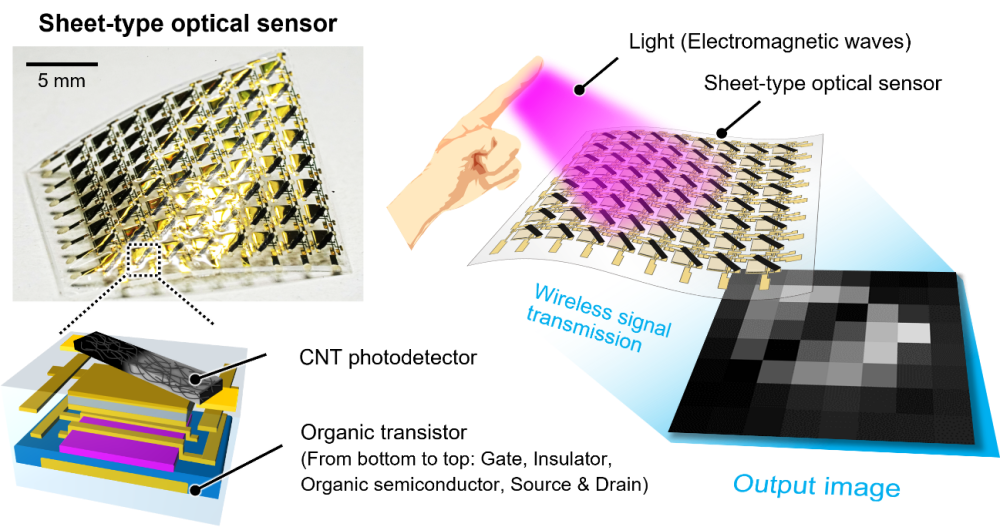2024.02.16
News
Organic Electronics Lead to New Ways to Sense Light
Joint press release by Osaka University and Chuo University.
In a study recently published in Advanced Materials, researchers from Osaka University and Chuo University have developed an optical sensor on an ultrathin, flexible sheet that can be bent without breaking. In fact, this sensor is so flexible, it will work even after it has been crumpled into a ball.
Instead of traditional light sensors, the researchers use an array of tiny carbon nanotube photodetectors printed on an ultra-thin polymer substrate (less than 5 μm). When exposed to light, the carbon nanotubes heat up, creating a thermal gradient that then generates a voltage signal. Doping the nanotubes with chemical carriers during printing further increases their sensitivity. Using these nanotubes, visible light as well as infrared light such as those related to heat or molecules can be measured.
Along with the carbon nanotube sensors, organic transistors are also printed on the polymer substrate to organize the voltage signals into an image signal. To read this signal, a computer does not need to be physically connected by wires to the sensor. Instead, a wireless Bluetooth module is used.

Fig.1: Sheet-type optical sensor integrated with a carbon nanotube photodetector and an organic transistor. Attribution 4.0 International (CC BY 4.0), Reprinted with permission from Advanced Materials .
Credit: 2024 Araki et al., Ultraflexible Wireless Imager Integrated with Organic Circuits for Broadband Infrared Thermal Analysis, Advanced Materials
For the research details, please see Osaka University’s press release.
https://resou.osaka-u.ac.jp/en/research/2024/20240123_2
The article, “Ultraflexible Wireless Imager Integrated with Organic Circuits for Broadband Infrared Thermal Analysis,” was published in Advanced Materials at DOI:https://doi.org/10.1002/adma.202309864
Authors: Rei Kawabata, Kou Li, Teppei Araki, Mihoko Akiyama, Kaho Sugimachi, Nozomi Matsuoka, Norika Takahashi, Daiki Sakai, Yuto Matsuzaki, Ryo Koshimizu, Minami Yamamoto, Leo Takai, Ryoga Odawara, Takaaki Abe, Shintaro Izumi, Naoko Kurihira, Takafumi Uemura, Yukio Kawano, and Tsuyoshi Sekitani.
